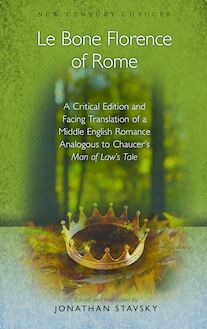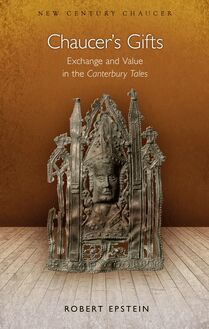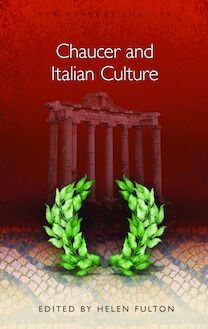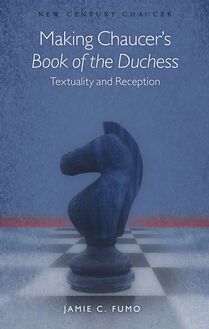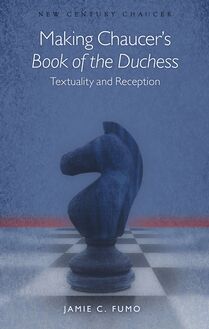-
 Univers
Univers
-
 Ebooks
Ebooks
-
 Livres audio
Livres audio
-
 Presse
Presse
-
 Podcasts
Podcasts
-
 BD
BD
-
 Documents
Documents
-
- Cours
- Révisions
- Ressources pédagogiques
- Sciences de l’éducation
- Manuels scolaires
- Langues
- Travaux de classe
- Annales de BEP
- Etudes supérieures
- Maternelle et primaire
- Fiches de lecture
- Orientation scolaire
- Méthodologie
- Corrigés de devoir
- Annales d’examens et concours
- Annales du bac
- Annales du brevet
- Rapports de stage
La lecture à portée de main
Vous pourrez modifier la taille du texte de cet ouvrage
Découvre YouScribe en t'inscrivant gratuitement
Je m'inscrisDécouvre YouScribe en t'inscrivant gratuitement
Je m'inscrisEn savoir plus
Vous pourrez modifier la taille du texte de cet ouvrage
En savoir plus

Description
Geoffrey Chaucer wrote at a turning point in the history of timekeeping, but many of his poems demonstrate a greater interest in the moral dimension of time than in the mechanics of the medieval clock. Chaucer and the Ethics of Time examines Chaucer’s sensitivity to the insecurity of human experience amid the temporal circumstances of change and time-passage, as well as strategies for ethicising historical vision in several of his major works. While wasting time was sometimes viewed as a sin in the late Middle Ages, Chaucer resists conventional moral dichotomies and explores a complex and challenging relationship between the interior sense of time and the external pressures of linearism and cyclicality. Chaucer’s diverse philosophical ideas about time unfold through the reciprocity between form and discourse, thus encouraging a new look at not only the characters’ ruminations on time in the tradition of St Augustine and Boethius, but also manifold narrative sequences and structures, including anachronism.
List of Abbreviations
Introduction
1 Elegiac Time and the Pleasure of Forgetting in the Book of the Duchess
2 Seeing Time and the Illusion of Control in Troilus and Criseyde
3 ‘What may ever laste?’: Narrativising Transience in the House of Fame
4 The Process of Time in the Parliament of Fowls
5 Nonlinear Time in Chaucer’s Frame-Narrative and the Wife of Bath’s Prologue
Conclusion
Notes
Bibliography
Sujets
Informations
| Publié par | University of Wales Press |
| Date de parution | 15 février 2022 |
| Nombre de lectures | 0 |
| EAN13 | 9781786838377 |
| Langue | English |
| Poids de l'ouvrage | 1 Mo |
Informations légales : prix de location à la page 0,4400€. Cette information est donnée uniquement à titre indicatif conformément à la législation en vigueur.
Extrait
NEW CENTURY CHAUCER
Chaucer and the Ethics of Time
N E W C E N T U R Y C H A U C E R
Series Editors
Professor Helen Fulton, University of Bristol Professor Ruth Evans, Saint Louis University
Editorial Board
Professor Ardis Butterfield, Yale University Dr Orietta Da Rold, University of Cambridge Dr David Matthews, University of Manchester
The works of Geoffrey Chaucer are the most-studied literary texts of the Middle Ages, appearing on school and university syllabuses throughout the world. From The Canterbury Tales through the dream visions and philosophical works to Troilus and Criseyde , the translations and short poems, Chaucer s writing illuminates the fourteenth century and its intellectual traditions. Taken together with the work of his contemporaries and successors in the fifteenth century, the Chaucerian corpus arguably still defines the shape of late medieval literature.
For twentieth-century scholars and students, the study of Chaucer and the late Middle Ages largely comprised attention to linguistic history, historicism, close reading, biographical empiricism and traditional editorial practice. While all these approaches retain some validity, the new generations of twenty-first-century students and scholars are conversant with the digital humanities and with emerging critical approaches - the affective turn , new materialisms, the history of the book, sexuality studies, global literatures, and the cognitive turn . Importantly, today s readers have been trained in new methodologies of knowledge retrieval and exchange. In the age of instant information combined with multiple sites of authority, the meaning of the texts of Chaucer and his age has to be constantly renegotiated.
The series New Century Chaucer is a direct response to new ways of reading and analysing medieval texts in the twenty-first century. Purpose-built editions and translations of individual texts, accompanied by stimulating studies introducing the latest research ideas, are directed towards contemporary scholars and students whose training and research interests have been shaped by new media and a broad-based curriculum. Our aim is to publish editions, with translations, of Chaucerian and related texts alongside focused studies which bring new theories and approaches into view, including comparative studies, manuscript production, Chaucer s post-medieval reception, Chaucer s contemporaries and successors, and the historical context of late medieval literary production. Where relevant, online support includes images and bibliographies that can be used for teaching and further research.
The further we move into the digital world, the more important the study of medieval literature becomes as an anchor to previous ways of thinking that paved the way for modernity and are still relevant to post-modernity. As the works of Chaucer, his contemporaries and his immediate successors travel into the twenty-first century, New Century Chaucer will provide, we hope, a pathway towards new interpretations and a spur to new readers.
NEW CENTURY CHAUCER
Chaucer and the Ethics of Time
GILLIAN ADLER
UNIVERSITY OF WALES PRESS
CARDIFF
2022
Gillian Adler, 2022
All rights reserved. No part of this book may be reproduced in any material form (including photocopying or storing it in any medium by electronic means and whether or not transiently or incidentally to some other use of this publication) without the written permission of the copyright owner except in accordance with the provisions of the Copyright, Designs and Patents Act 1988. Applications for the copyright owner s written permission to reproduce any part of this publication should be addressed to the University of Wales Press, University Registry, King Edward VII Avenue, Cardiff CF10 3NS.
www.uwp.co.uk
British Library Cataloguing-in-Publication Data
A catalogue record for this book is available from the British Library.
ISBN 978-1-78683-836-0
eISBN 978-1-78683-837-7
The right of Gillian Adler to be identified as author of this work has been asserted in accordance with sections 77, 78 and 79 of the Copyright, Designs and Patents Act 1988.
Typeset by Marie Doherty
Printed by CPI Antony Rowe, Melksham, United Kingdom
To my parents and to Hunter, caro mihi valent stillae temporum the drops of time are so precious to me
Augustine, Confessions , XI.2
CONTENTS
Acknowledgements
List of Abbreviations
Introduction
1 Elegiac Time and the Pleasure of Forgetting in the Book of the Duchess
2 Seeing Time and the Illusion of Control in Troilus and Criseyde
3 What may ever laste? : Narrativising Transience in the House of Fame
4 The Process of Time in the Parliament of Fowls
5 Nonlinear Time in Chaucer s Frame-Narrative and the Wife of Bath s Prologue
Conclusion
Notes
Bibliography
ACKNOWLEDGEMENTS
I take pleasure in recording my sincere appreciation for the vibrant conversations I have had with colleagues and mentors over the years in which this book has evolved. I am especially grateful to Peggy Ellsberg, who has been an extraordinary adviser, interlocutor and friend since I first began reading Chaucer. Special thanks to Christine Chism, Matthew Fisher, Arvind Thomas, Zrinka Stahuljak, Thomas O Donnell, and William Shullenberger for their unstinting encouragement, feedback and kindness. I am indebted to Paul Strohm, as this book developed in unexpected ways from our frequent discussions of time in medieval life, and from his generous support and friendship. I would further like to thank the editors and staff at the University of Wales Press, who have advocated this book from the beginning and assisted me during various stages of writing and revising. Finally, my most profound debts are to my siblings and my parents, to whom this book is lovingly dedicated.
LIST OF ABBREVIATIONS
ChR
Chaucer Review
MED
Middle English Dictionary
OED
Oxford English Dictionary
SAC
Studies in the Age of Chaucer
Individual works by Chaucer are abbreviated in accordance with The Riverside Chaucer , p. 779.
INTRODUCTION
S omewhere along the road from London to Canterbury Cathedral, Harry Bailly, the host of the pilgrimage in Chaucer s Canterbury Tales , worries aloud about the passage of time. In a harrowing speech, he repeatedly personifies time as a destructive force. The tyme wasteth nyght and day , Harry Bailly remarks, figuring nyght and day as victims, rather than fragments, of time (MLT 20). Time is a thief, which steleth these durations from human possession, but also a precious belonging, the loss of which ruins ( shendeth ) us (21, 28). This series of proverbial analogies continues as Harry Bailly compares time to virginity and, adopting a more sinister tone, associates the loss of the present moment with corporeal decay. Lat us nat mowlen thus in ydelnesse , he directs the company of pilgrims, concluding his moralistic sermon on the tragic, irreversible flow of time with the gruesome image of mildew and rust corroding sluggish bodies (32).
As a master versifier of the aphorisms of time and the self-appointed timekeeper of a storytelling contest, Harry Bailly seems peculiarly unaware of his own susceptibility to ydelnesse . He delivers his lengthy speech to ensure the progress of the competition during the course of pilgrimage and, specifically, to hasten the Man of Law, the pilgrim lined up to speak next, to commence his narration of a tale. Although his knowledge of how to tell the hour of the day is apparently superficial ( he were nat depe ystert in loore ), his assessment that the sun has run the ferthe part, and half an houre and moore of the artificial day reflects such a degree of learnedness and precision that he is able to conclude the hour is ten of the clokke (4, 3, 14). According to Peter W. Travis, this moment is remarkable as an early instance of a literary character figuring out the exact, equinoctial hour of the day through a technically convoluted temporal periphrasis . 1 However, it turns out to be, quite frankly, wrong , a fault in timetelling that matches Harry Bailly s inability to monitor the passage of time during his extensive admonishment against wasting it. His speech, marked by its length and the frequency of metaphors, constitutes a fitting preamble to the Man of Law s own significant delay as soon as he is called upon to narrate. The Man of Law s digression, cataloguing the very topics he will avoid discussing, is glaringly circuitous given that he has just promised - using formal legal language, no less - to begin. All of these temporal aspects of form in the Headlink to the Man of Law s Tale indicate a humorous irony, as Harry Bailly is supposed to be an expert timekeeper and his pilgrims are meant to follow his lead.
The relationship between Harry Bailly s pseudo-philosophical meditation on time and the narrative form it takes is a starting point for the present book, Chaucer and the Ethics of Time . This study analyses the interplay between the theme of time and the structures of time in several of Chaucer s major works, arguing that it is key to seeing a temporal ethics in his poetry - namely, that time is crucial in directing how human beings ought to behave. The moral dimension of time in Chaucer s works is complex, suggesting the poet s sense that right or wrong uses of time and temporal perspectives depend on circumstances and intentions, rather than a categorical set of rules. As Mark Miller writes, philosophy for Chaucer is more a matter of probing a difficult and evolving set of problems than it is of laying out doctrines that can be neatly summarised and classified according to schools of thought . 2 In this light, Harry Bailly s own ydelnesse is little indication that he wastes time; to idle has a productive potential , as Adin Esther Lears discusses, and even constitutes a sort of literary principle of the Middle Ages. 3 In the literature that embraces this principle, according to James Simpson, an author enact
-
 Univers
Univers
-
 Ebooks
Ebooks
-
 Livres audio
Livres audio
-
 Presse
Presse
-
 Podcasts
Podcasts
-
 BD
BD
-
 Documents
Documents
-
Jeunesse
-
Littérature
-
Ressources professionnelles
-
Santé et bien-être
-
Savoirs
-
Education
-
Loisirs et hobbies
-
Art, musique et cinéma
-
Actualité et débat de société
-
Jeunesse
-
Littérature
-
Ressources professionnelles
-
Santé et bien-être
-
Savoirs
-
Education
-
Loisirs et hobbies
-
Art, musique et cinéma
-
Actualité et débat de société
-
Actualités
-
Lifestyle
-
Presse jeunesse
-
Presse professionnelle
-
Pratique
-
Presse sportive
-
Presse internationale
-
Culture & Médias
-
Action et Aventures
-
Science-fiction et Fantasy
-
Société
-
Jeunesse
-
Littérature
-
Ressources professionnelles
-
Santé et bien-être
-
Savoirs
-
Education
-
Loisirs et hobbies
-
Art, musique et cinéma
-
Actualité et débat de société
- Cours
- Révisions
- Ressources pédagogiques
- Sciences de l’éducation
- Manuels scolaires
- Langues
- Travaux de classe
- Annales de BEP
- Etudes supérieures
- Maternelle et primaire
- Fiches de lecture
- Orientation scolaire
- Méthodologie
- Corrigés de devoir
- Annales d’examens et concours
- Annales du bac
- Annales du brevet
- Rapports de stage
